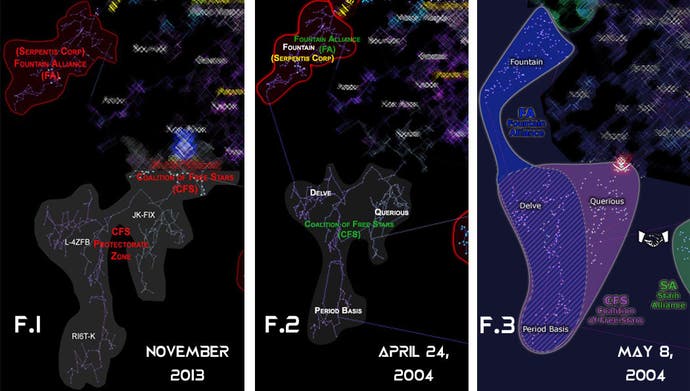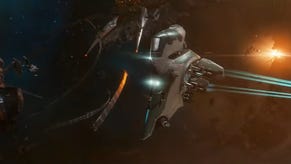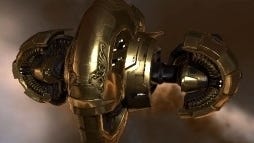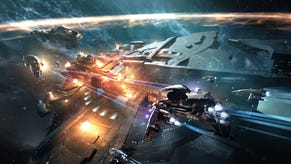Only Eve Online could warrant a history book
Update: Kickstarter ends and was a big success.
UPDATE 27/05 8.30AM BST: Author Andrew Groen was obviously onto something: his Eve Online history book smashed its $12,500 Kickstarter target, raising a grand total of $95,729 in around 30 days.
It's full steam ahead, then, including production of a $50 hardcover, coffee table book laid out by a professional designer who usually works with the naughty Cards Against Humanity team.
The project has also secured an artist who will recreate the famous battles of Eve's past. The idea is to have him do it as a police sketcher would, taking descriptions from Eve Fleet Commanders over the phone.
So! More pretty pictures, better content and a big hardcover book. Let's see your friends and family try and tell you internet spaceships aren't serious business now.
UPDATE 25/04 9AM BST: Success! A History of the Great Empires of Eve Online has been funded nearly twice over on Kickstarter in under 24 hours, raising more than $17,500 (at time of writing). Full steam ahead.
ORIGINAL STORY 24/04 5PM BST: Whether or not you play space MMO Eve Online, chances are you've heard of it. Did you hear about the controversial banning of a player who tricks people into recorded chat shows while scamming them? Perhaps you read about the colossal battle involving more than 7500 players and more than $300K worth of translated-into-real-money spaceship damage. No? You must have heard about the Eve convention where one incredibly influential player suggested a naysayer go kill themselves.
Drama, politics, huge battles - Eve Online is a peerless sandbox massively-multiplayer online game, and it gets stronger and stronger with every passing day.
Perhaps it's only right, then, that someone document it - record its history. And that's what journalist Andrew Groen intends to do, in his A History of the Great Empires of Eve Online - "a book about the politics, warfare, betrayal and culture that shaped the first decade of Eve Online".
"It's the first history book ever written about humans living in a digital world."
He's worked for six months on the book so far, interviewing and researching, but now he needs crowd-funding for the next step. He's after $12,500 on Kickstarter, which will pay for cover design, layout designers, editors, printer costs and the hundreds of hours he'll need to devote to researching and interviewing to finish it.
He intends to involve the Eve community, CCP and journalists, to ensure his material is as accurate, impartial and readable as possible.
There are only two pledge tiers: $10 and $25. The former secures you a digital copy of the book and the latter secures you a soft-covered version of the book. Both grant pre-release access to the text from which you can suggest edits or give feedback.
"I'm writing this because it's an amazing story that deserves to be told in an accessible way," wrote Groen.
"What if [Eve] outlives the people who remember these stories first-hand?"
Andrew Groen
"I'm also writing this because this history has never been written down before. As time moves on, key players and memories of the early days of this universe have started to fade, and we risk losing the history of one of gaming's most unique communities who inhabit one of humanity's first true virtual worlds.
"Eve is over 10 years old, and it's more popular now than it ever has been. What if it lives to be 20? Or 50? What if it outlives the people who remember these stories first-hand?"
There's a scary thought.
Andrew Groen shared an anecdote with Eurogamer about the fall of democracy in the early days of Eve Online.
"There was an organisation in the very early days of Eve - around 2003 to early 2004 - called the Coalition of Free Stars. They were a unique group because to this day they're one of the only functional democracies in Eve's history. I say 'functional' because democracy doesn't generally work in Eve. It's a notoriously slow form of government (even in the real world) and in Eve it pays to be quick and decisive so more often than not you end up with something of an autocracy.
"The CFS controlled a few regions in the south-west of Eve that are today known as Delve, Querious, and Period Basis. They were different from other alliances in the player-controlled portion of the game, 'null-sec', because they allowed any average Eve player to use their space, a 'Free Space' edict. If you entered the space of any other alliance that you weren't directly allied with they'd pretty much shoot you on sight. But the CFS was committed to carving out and holding a few regions where average players could experience the outer rim territories without having to make allies - and necessarily, enemies - with giant, territory-holding corporations.
"They were able to hold this space and keep it safe because of a bit of bad game design. In those days there was only one way in or out of that entire region of space, just one warp gate that connected three regions - many dozens of star systems - to the entirety of the rest of the game. So the CFS could just control one point and keep three whole regions safe. It was essentially like Australia in Risk. You don't need to defend the entire continent, just heavily defend the bottleneck of Indonesia and all of Australia will be safe from invasion.
"And so died democracy in New Eden"

"The CFS was surrounded by highly militarised, battle-hardened alliances, but they were able to carve a place for themselves in a well-defended, relatively poor area and so nobody bothered them too much.
"Unfortunately/fortunately (depending on who you ask), CCP Games eventually decided to change this, and they decided to open up new gates into these regions, connecting CFS territory with their neighbouring regions. Once the new pathways into CFS space were opened it wasn't long before the CFS's neighbours realised their turf could be taken quite easily. Specifically, their neighbour to the north, Fountain Alliance, moved in on them and steamrolled the democrats of the CFS in a very short amount of time.
"The CFS wasn't equipped to fight a sovereignty war since they were mostly miners and more laid back players. Many of the key corporations in the Coalition of Free Stars decided not to even resist and just left the region. They joined the CFS specifically to avoid war in the first place. Those who stayed lost the fight thanks to a lack of experience, and because their loose democratic structure that made it difficult to be organized and respond quickly. And so died democracy in New Eden."









